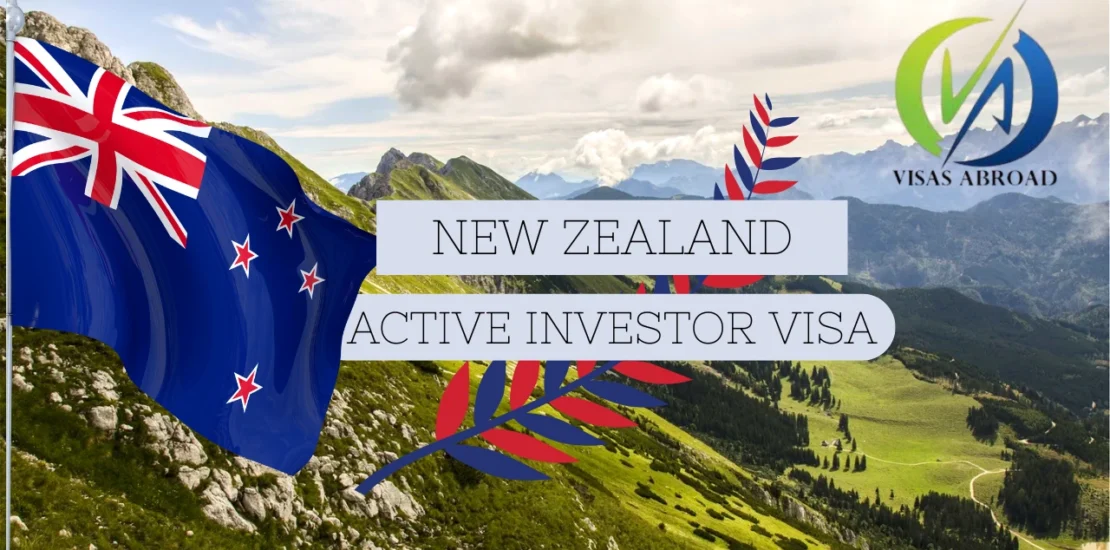New Zealand Extends ‘Active Investor Plus Visa Scheme’ with Two New Streams
- May 8, 2025
- Posted by: Vincent
- Category: New Zealand

In a strategic shift to foster economic Growth and attract high-value investors, New Zealand has reformed its Active Investor Plus Visa scheme. This scheme adds two new investment streams, Growth and Balanced, with greater flexibility and investment options for prospective migrants. The reforms seek to facilitate investment, eliminate vestiges of constraint, and encourage active engagement in the New Zealand economy.
Overview of the Active Investor Plus Visa
The Active Investor Plus Visa is available to applicants who are prepared to make substantial investments in New Zealand’s economy. Residents gain residency and subsequently permanent residency through investment in qualifying assets. Existing program updates are a sign that the government values investors who have the potential to positively influence the country’s economic growth.
Introduction of Two New Investment Classes
1. Growth Category
- Minimum Investment: NZD 5 million
- Investment Term: 3 years
- Residency Requirement: A minimum of 21 days in New Zealand during the investment term
- Investment Focus: Active investments, i.e., direct investments and managed funds
The growth category is for investors who want to be more involved in New Zealand’s economy. Through managed funds and direct investment, this category enables investors to be heavily involved in the country’s domestic businesses and industries.
2. Balanced Category
- Minimum Investment: NZD 10 million
- Investment Term: 5 years
- Residency Requirement: At least 105 days’ stay in New Zealand during the investment period
- Investment Type: Combination of investment types such as bonds, equities, and property developments
The balanced category is a diversified investment in which investors allocate money across various asset classes. It is designed for investors who seek a combination of active and passive investments.
Enlarged Range of Eligible Investments
The new visa policy relaxes the criteria for qualifying investment, especially under the Balanced category. New types of investments added are:
- Bonds: State and corporate bonds
- Property Investments:
- New housing developments are being introduced to the market, adding stock
- New or established commercial or industrial projects with value addition, e.g., earthquake strengthening
The additions are intended to spur Growth in core sectors and meet infrastructure requirements.
Simplifications and Key Changes
Elimination of English Language Requirement
Applicants once had to have English language skills. This requirement has been eliminated, making the visa more accessible to a broader range of investors.
Elimination of Investment Restrictions
Some investment classes were previously restricted, but these restrictions have been eliminated, allowing investors to diversify their investments across a broader range of asset classes.
Addition of On-Call Investments
Investors can invest committed funds in short-term holding investments, such as term deposits or bonds, until they are invested in managed funds. This provides additional management flexibility for investment time horizons.
Category Switching Investment Flexibility
Applicants are given one switch between the Growth and Balanced categories to accommodate changing investment tastes or strategies.
Application Process and Existing Applicant Transition
Applicants or their representatives may apply on the current application form for the Active Investor Plus Visa, which has been revised to include the new categories. Applicants who applied before April 1, 2025, and whose residence has not yet been granted, may switch to the new visa arrangements by withdrawing their current application and reapplying under the new categories. The transition process can be accessed through Immigration New Zealand, and the application fees for transitioning will be waived.
Economic Contribution to New Zealand
The new visa system will attract high-value investment, drive economic Growth, and create jobs. By offering a diverse and broad range of investment opportunities, New Zealand positions itself as a preferred destination for foreign investors seeking secure and rewarding investment options.
QUESTION AND ANSWERS
Q1: What are the key differences between the Balanced and Growth categories?
A1: The growth category involves a minimum NZD 5 million investment within 3 years in actively managed investments, such as direct and managed funds. The residency requirement is only 21 days. The balanced category requires a minimum NZD 10 million investment for a period of 5 years, which can be a combination of investment options, including bonds and property. One must reside in New Zealand for a minimum of 105 days.
Q2: After applying, may I change the Growth to the Balanced category?
A2: Yes, one can switch the investment category once during the application duration. This provides increased flexibility to switch investment plans as needed.
Q3: Will there be a language test requirement for the new scheme?
A3: No, the English language requirement has been eliminated since the visa scheme is being extended more broadly to more investors.
Q4: What are the appropriate property investments within the Balanced category?
A4: The appropriate investments are new residential dwelling constructions that increase the housing supply and new or refurbished commercial or industrial developments that create value, e.g., earthquake strengthening.
Q5: How soon must I invest my capital once my visa is approved?
A5: Investment must be finalised within 6 months from the date of approval-in-principle. Applicants can apply for a 6-month extension if necessary.
The New Zealand renewal of the Active Investor Plus Visa program demonstrates that it is serious about onboarding high-value investors and spurring economic Growth. By including the Growth and Balanced categories, eliminating the language prerequisites, and broadening the range of available investment opportunities, the country presents a less restrictive and more hospitable entry door for investors wishing to reside there. These measures aim to establish New Zealand as an even more compelling centre of attraction for foreign investment.
